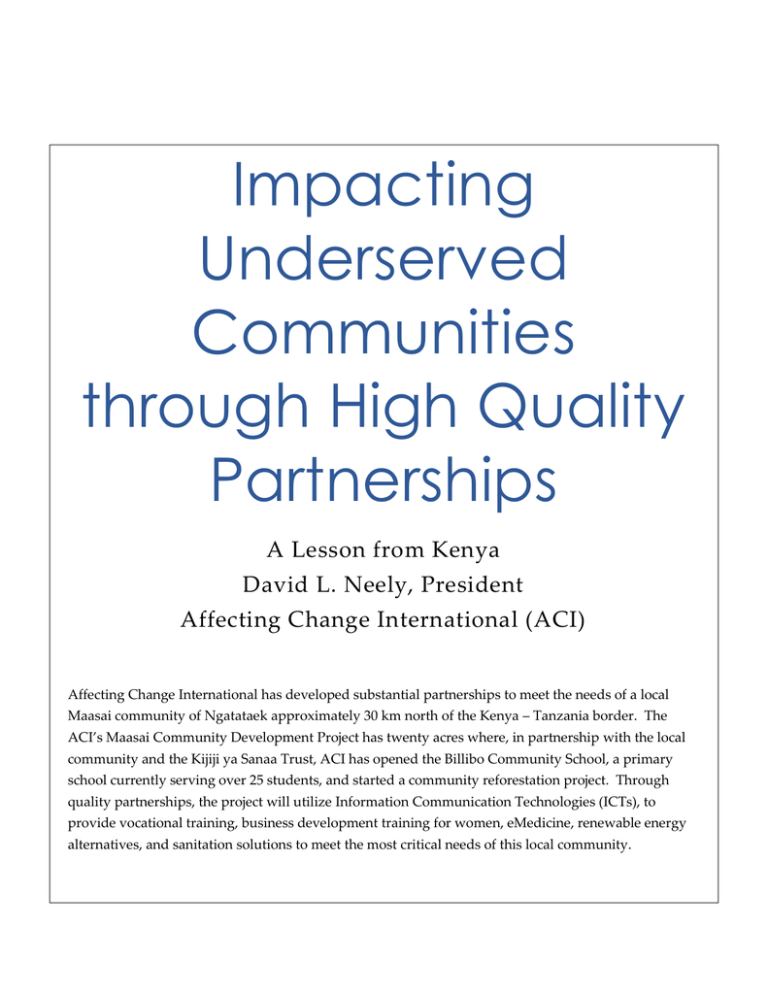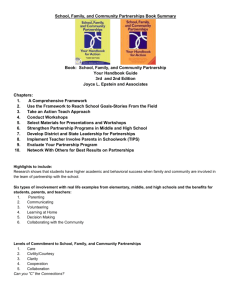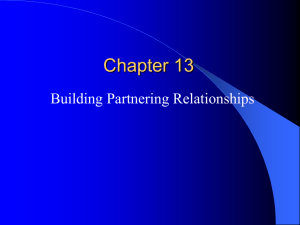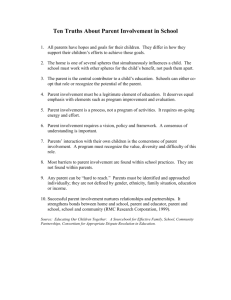File - Affecting Change International
advertisement

Impacting Underserved Communities through High Quality Partnerships A Lesson from Kenya David L. Neely, President Affecting Change International (ACI) Affecting Change International has developed substantial partnerships to meet the needs of a local Maasai community of Ngatataek approximately 30 km north of the Kenya – Tanzania border. The ACI’s Maasai Community Development Project has twenty acres where, in partnership with the local community and the Kijiji ya Sanaa Trust, ACI has opened the Billibo Community School, a primary school currently serving over 25 students, and started a community reforestation project. Through quality partnerships, the project will utilize Information Communication Technologies (ICTs), to provide vocational training, business development training for women, eMedicine, renewable energy alternatives, and sanitation solutions to meet the most critical needs of this local community. Impacting Underserved Communities through High Quality Partnerships Impacting Underserved Communities through High Quality Partnerships A Lesson from Kenya David L. Neely, President Affecting Change International (ACI) One key motive for developing high quality partnerships is the belief that working together is more effective than working in isolation. Partnerships operate under different local conditions, depending on the detailed nature of the problems, the institutional environment, political factors, experiences, and culture. Given that requirements are always specific to these conditions, there is no one model for a successful partnership. The one linking characteristic of high quality partnerships is that they are designed to bring together relevant actors with similar motivations to concentrate on coordinated activities in different thematic fields to impact a local community in positive and sustainable ways without worrying about who gets the credit. ACI has been working in a highly effective partnership relationship since 2010 to meet the needs of a Maasai community in Kenya using the ICT Model Community Center concept developed in cooperation between ACI and Helix Architecture & Design, a Partnership Testimony “The Blue Valley School District’s Center for Advanced Professional Studies (CAPS), which is revolutionizing high school education through a nationally recognized, profession-based educational model, was created in partnership with 74 international business partners, hundreds of business professional mentors, six leading universities and education experts. CAPS is designed to provide high school students the skills needed to succeed in the competitive college environment and global work force. CAPS is an example of how private industry, such as IBM, Black & Veatch, Cerner, Cisco, Sprint, Bayer, Garmin and the public education system can partner to produce personalized learning experiences that educate the workforce of tomorrow. Authentic, real world projects provided by business partners like ACI, produce professional experiences in social innovation and international problem solving.” Donna M. Deeds Executive Director Center for Advanced Professional Studies (CAPS) Blue Valley School District Overland Park, Kansas The World Conference on InfoPoverty, United Nations March 22-23, 2012 1 Impacting Underserved Communities through High Quality Partnerships Kansas City, MO based firm. The Maasai Community Development Project currently consists of a primary school called the Billibo Community School and a community reforestation program on twenty acres in the area of Ngatataek approximately 30 km north of the Kenya – Tanzania border. Future elements of the project include a vocational training school, business development training for women, eMedicine based clinic, a renewable energy module, and a water/sanitation solution for the community, all of which include the appropriate use of ICT’s. The project partnership started with the original request for assistance by the Kijiji ya Sanaa Trust, a Kenya based nonprofit, and evolved into the concept and design phase, which included a critical needs assessment conducted in cooperation between the trust, the local Maasai community leadership, local Maasai family units, Helix, Africa Encounter – Kenya, and ACI. It is important to note that prior to full community involvement in the needs assessment, our initial team determination was that water was the greatest need. However, once the community provided their input into the needs assessment process, it was determined that their greatest need was education for their children. Once the needs of the community were established, the emphasis was on developing full community support and buy-in. During that process, ACI began making contact with potential actors to collaborate in meeting the needs of this community. In the spring of 2011, the project partnership expanded to include the Center for Advanced Professional Studies (CAPS), a part of Blue Valley Public Schools in Overland Park, Kansas. The engineering department agreed to make the Maasai Community Development Project an option for its students to use as their semester project. Two students developed the Maji Straw as a possible water purification solution for the community and are in the process of obtaining a patent for the design as a result. The The World Conference on InfoPoverty, United Nations March 22-23, 2012 2 Impacting Underserved Communities through High Quality Partnerships CAPS leadership believed that the concept of the ICT Model Community Center provided real world application opportunity for its students across multiple disciplines. From August of 2011 to present, the ACI-CAPS partnership has brought in several corporate sponsors to help in the construction of an education module prototype, including Weitz Construction, Combes Construction, Derbigum, Hanna, and consultative assistance provided by Helix and Black & Veatch. The new educational module will provide additional education space, secure storage for ICT equipment, cell phone charging station for the community, and a center for technical and women’s issues education. Our project partnership recognizes the urgency of the situation and strives to have the maximum possible impact on the realization of the Millennium Development Goals by 2015, as well as on positive development results over the longer term in this community. This urgency has driven the project partnership to agree to some basic principles that ensure the partnership remains focused and effective. These principles include: 1. Having a recognizable and autonomous structure to help establish identity, i.e. The Maasai Community Development Project. 2. Having ownership of development priorities by the developing community. 3. Being focused on results. Our investments and efforts must have a lasting impact on eradicating poverty, reducing inequality, enhancing the capacity of the community in sustainable ways, while maintaining alignment with the local community’s own priorities and culture. 4. Inclusive partnership development. Openness, trust, mutual respect, and learning lie at the core of the partnership in support of the development goals while recognizing the different and complementary roles of all the partners. 5. A learning culture where all our partners are able to learn from one another by allowing new ideas to come forward in an open exchange of ideas and experiences. 6. A commitment to ethical business practices. 7. Transparency and accountability to each other. Transparent practices form the basis for enhanced accountability. The World Conference on InfoPoverty, United Nations March 22-23, 2012 3 Impacting Underserved Communities through High Quality Partnerships 8. Being in agreement with these basic principles strengthen our partnership’s efforts to achieve concrete and sustainable results. It will also help this local Maasai community become a catalyst for similar development and capacity-building in other communities in east Africa as well. In conclusion, a high quality partnership has many characteristics, which are not limited to those I have highlighted. Different situations will require tailored solutions, and workable agreements will likely look different from those developed previously. Yet, the value of developing high quality partnerships to meet real world problems is clear. As previously stated, working together is more effective than working in isolation. Likewise, having local community leadership as active participants on the partnership team is critical. This has certainly been the case with our Maasai Community Development Project in Kenya. Affecting Change International continues to work to mobilize individuals and nongovernmental organizations to improve the physical, emotional, and economic conditions of the underprivileged and underserved in our global community. Through the use of high quality partnerships, we assist these developing communities to meet their most critical needs in sustainable ways one life at a time with partners who are willing to share, or even to forego, the credit for a project’s success. The Children of the Billibo Community School in Ngatataek, Kenya at the school’s dedication on January 4, 2012. The World Conference on InfoPoverty, United Nations March 22-23, 2012 4






